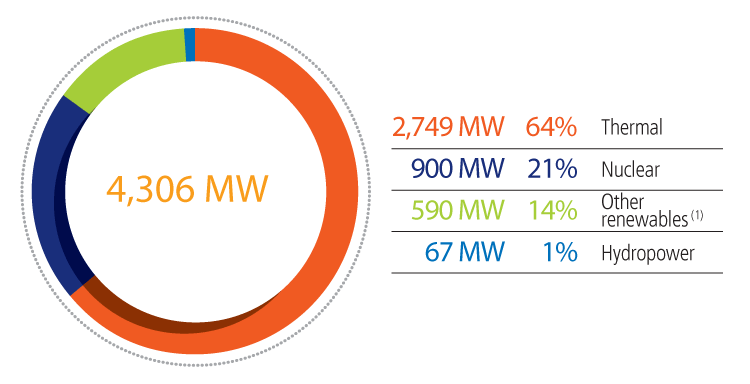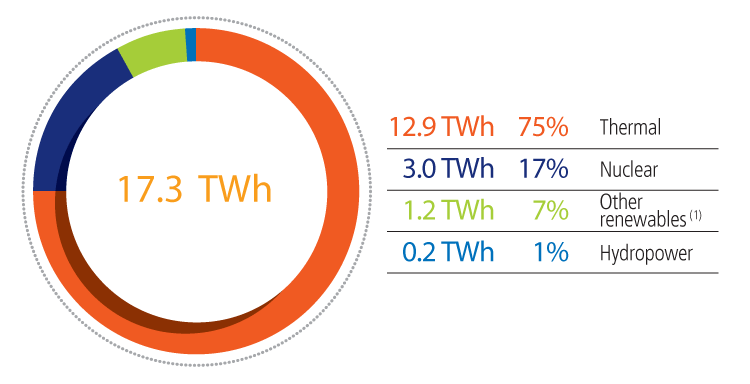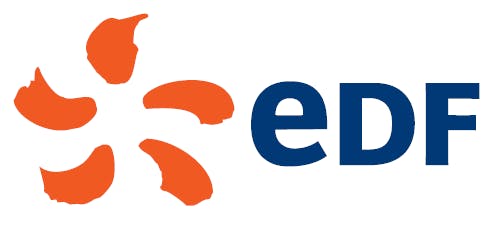The Division’s clients are in the industrial and business sectors; contracts with theFCA group still form a large part of the business with major-account customers. Due to the health crisis and measures imposed to prevent the spread of the virus, FCA had to suspend its production activities for several weeks, and the automotive market saw its sales plummet for several months. Consequently, discussions were undertaken to find acceptable solutions for the parties with a view to overcoming the difficulties encountered (to date, these discussions are still ongoing).
Projects are developed with customers in the form of industrial partnerships or performance agreements. The business model can be adjusted to customer requirements, and may range from customer assistance to third-party financing or direct investment by Edison in the projects (the Esco model).
Edison is active in the public services sector via Edison Facility Solutions, which specialises in energy efficiency and integrated energy management, notably for hospitals in the North and centre of Italy. This year, due to the health crisis, the public health sector has been especially impacted, with its activities being reorganised to cope with the situation. This has had repercussions on the company in terms of delays in the completion and commissioning of certain projects.
Lastly, energy efficiency activities are conducted internationally by subsidiaries inSpain, Poland, and Morocco, all of which are wholly owned by Fenice.
1.4.5.2.3.5 Regulated activities
Gas storage
Edison owns 100% of the Edison Stoccaggio company, dedicated to regulated gas-storage activities. Edison also operates three storage facilities in depleted reservoirs (fields which have been depleted of natural gas): Cellino (since 1984), Collalto (since 1994) and San Potito & Cotignola (since 2013). The volume being worked upon on all of the sites is 1 billion cubic metres.
Distribution
Gas distribution in Italy is regulated and supervised by ARERA, the electricity and gas authority that establishes, in particular, quality and safety parameters, as well as network access rules.
Infrastrutture Distribuzione Gas SpA is the company dedicated to the distribution of natural gas within the Edison group. In order to refocus on its strategic activities, inJanuary 2021 Edison announced the signature of an agreement with 2i Rete Gas for the disposal of the entirety of this company.
1.4.5.3 Other international
Installed capacity and output of "Other international" - 2020
Installed capacity
In MW

4 306 MW
Thermal : 2 749 MW 64%
Nuclear : 900 MW 21%
Other renewables : 590 MW 14%(1)
Hydropower : 67 MW 1%
Electricity output
In TWh

17,3 TWh
Thermal : 12,9 TWh 75%
Nuclear : 3,0 TWh 17%
Other renewables : 1,2 TWh 7%(1)
Hydropower : 0,2 TWh 1%
(1) Excluding data for EDF Renewables, see section 1.4.1.3.3 “EDF Renewables activity”.
NB: The values take into account rounding.
1.4.5.3.1 Northern Europe
Belgium
The Benelux region features important interfaces with the Franco-German electricity marketplace and projects for new links with Germany and with Great Britain are being examined. Benelux also constitutes an important node in the European gas market because of its numerous import and transit infrastructures, such as the Zeebrugge hub and the Dunkirk LNG terminal nearby.
The EDF group is present in Belgium through EDF Belgium, Luminus and Citelum.
EDF Belgium
As part of a long-term nuclear energy cooperation agreement with Electrabel, EDF holds 50% in undivided co-ownership of the Tihange 1 nuclear power plant, through its wholly-owned Belgian subsidiary, EDF Belgium. The capacity attributed to EDF represents 481MW (or 2% of Belgian generation capacity). Tihange 1 output, which is attributed to EDF Belgium is sold to EDF (via a long-term contract renewed at the end of 2015 for 10 additional years) which, in turn, resells the electricity to Luminusat a market price.
Belgium’s 2003 nuclear phase-out legislation originally provided for the closure of Tihange 1 on 1 October 2015. Nevertheless, it was finally decided to extend its operation upon 2025, following the adoption in 2012 by the Belgian government of the Equipment Plan, and the Law of 2013 amending the Law of 2003 pertaining to the timeframe for the phasing out of nuclear energy. This extension was the subject of an agreement concluded on 12 March 2014 between Electrabel, EDF and theBelgian State, defining its terms and conditions.
The extension of the lifespan of Tihange 1 requires significant investment, with EDF’s share amounting to around €320 million, spread over the period from 2011 to 2021.
Luminus
At the end of 2020, the EDF group held 68.63% of the Luminus company through its subsidiary EDF Belgium, with the remaining equity held by Belgian public shareholders.
Luminus is the second largest player in the Belgian energy market after Engie Electrabel, and it holds a balanced upstream/downstream portfolio. The company, whose market share is close to 20%, possesses almost 10% of total Belgian generation capacity with 2,283MW installed at the end of 2020. The electricity generation of Luminus reached 7.6TWh in 2020. The company employs around 2,100 people.
